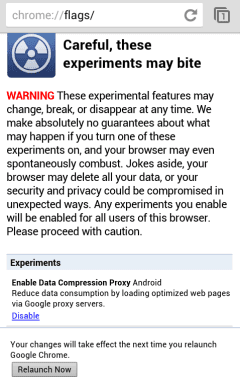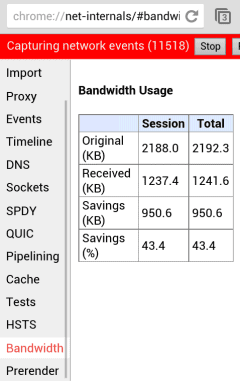1. open a new tab, type chrome://flags in the address bar and tap "Go"
2. tap "Enable" next to the "data compression proxy" experiment (it's the first one right now)
3. tap "Relaunch now"


After relaunching the browser, you can see how much data you've saved by opening a new tab, typing chrome://net-internals and selecting the "Bandwidth" section in the left sidebar. Then visit different sites in a different tab and check the stats.
Google's proxy is faster than Opera Mobile's Turbo feature, while saving almost the same amount of data. For example, the savings for AnandTech.com were 48.9%, while Opera Mobile Turbo's data savings were 50%. The savings for apple.com were 60.3%, while Opera Mobile Turbo's data savings were 57%. Chrome's major advantage is that the proxy doesn't slow down browsing, unlike Opera Mobile.
| Chrome | Opera Mobile | |
| anandtech.com | 48.9% | 50% |
| apple.com | 60.3% | 57% |
| amazon.com (mobile) | 20% | 18% |
| m.stanford.edu | 40% | 27% |
| googleblog.blogspot.com (desktop) | 5.4% | 28% |
Google says that "this feature has been shown to reduce data usage by 50% and speed up page load times on cellular networks. When the Data Compression Proxy feature is enabled, Chrome mobile opens a dedicated SPDY connection between your phone and one of the optimization servers running in Google's datacenters and relays all HTTP requests over this connection. (...) The browser-to-proxy connection runs over SSL, meaning that your browsing session is encrypted between your device and Google's servers." HTTPS connections and pages loaded in the incognito mode don't use the proxy. DNS lookups are performed by the proxy, while the images are converted to WebP and the resulting images are up to 80% smaller. "The proxy also performs intelligent compression and minification of HTML, JavaScript and CSS resources, which removes unnecessary whitespace, comments, and other metadata which are not essential to render the page. These optimizations, combined with mandatory gzip compression for all resources, can result in substantial bandwidth savings."
{ via Chromium blog }
No comments:
Post a Comment